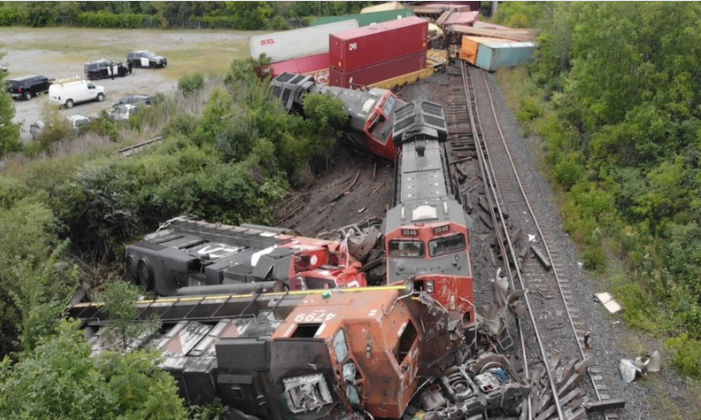TSB issues safety concern over alcohol consumption in rail industry

In the aftermath of a significant rail accident in Prescott, Ontario, the Transportation Safety Board of Canada (TSB) is shining a spotlight on alcohol consumption within the country's rail industry. The incident, which occurred on September 2, 2021, involved a collision and subsequent derailment of two Canadian National Railway (CN) freight trains, resulting in substantial damage and injuries to crew members.
Kathy Fox, chair of the TSB, says accidents are typically the result of multiple of factors, and this one is no different. You can read the full investigation report here. But the big takeaway is the rail traffic controller involved was operating under a heavy workload and made an erroneous assumption regarding the position of one of the trains. It was also determined the controller's performance and attention were likely impaired by alcohol.
"When you remove any one of those factors, the accident might not have happened," Fox notes. "But it's important to remember that the rail traffic controller's performance was affected by the persistent effects of alcohol."
While the exact prevalence of alcohol consumption in rail operations remains unclear, Fox says the TSB has investigated five occurrences since 1995 where alcohol or drugs were identified as present factors. Despite the lack of comprehensive data, the TSB issued a safety concern regarding the absence of a prescribed time period prohibiting alcohol consumption before assuming safety-critical duties in the rail industry.
Jerry Berriault is the operations manager for the rail pipeline investigations branch for the Ontario and Prairie regions. He compares it to regulations in the aviation sector, where pilots and air traffic controllers face specific time prohibitions on alcohol consumption before duty and says the absence of such regulations is a problem.
"The safety concern directed at the regulator provides a defined time limit and guideline for employees to make the decision of whether they are fit for duty," Berriault explains. "It also allows for enforcement activities by the regulator."
However, Fox clarifies the responsibility for addressing this issue does not solely rest with the regulator. While companies have their own policies regarding impairment and fitness for duty, the absence of regulatory enforcement may limit the effectiveness of these policies.
"Companies are taking action with strong policies regarding zero impairment and fitness for duty," says Fox. "But the issue is that regulation carries greater enforcement power, and current policies rely on individuals to self-assess their fitness for duty."
In response to the safety concern raised by the TSB, Transport Canada and the rail industry are urged to consider potential solutions to address this safety deficiency. While the TSB does not prescribe a specific timeframe for alcohol consumption prohibition, it says action is needed to ensure the safety of railway operations.
“We're not making a recommendation here; we're highlighting this issue,” says Fox.
“We believe there is a safety deficiency, and it's up to the regulator and the industry to take action."
The TSB's efforts to promote rail safety underscore the importance of addressing all potential risk factors, including alcohol consumption, to prevent accidents and protect the well-being of railway employees and the public.





